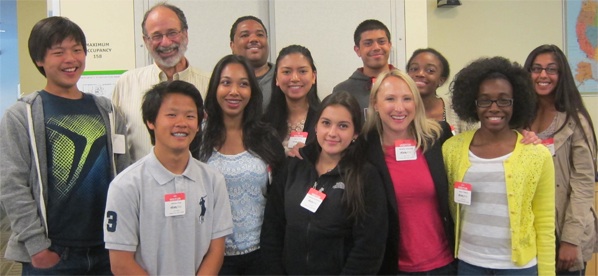Alvin Roth leverages market design to solve complex problems and transform lives.
The Nobel Prize winner and Stanford economics professor is celebrated for applying market design and game theory to create solutions to real-world problems -- such as creating a kidney donation exchange.
The first kidney exchange in the U.S. – involving a pair of donors and recipients in simultaneous transplant surgeries – was done in 2000, in Rhode Island. It took place not long after Roth went to work at Harvard University, and it was organized by the patients’ spouses, who met while sitting in a waiting room at a dialysis clinic.
“As an economist, you say, ‘That’s no way to design an exchange – we can do better than that,’ ” said Roth, who visited eBay Inc. to share insights from his groundbreaking work as part of eBay Data Labs’ Distinguished Speakers program.
Bringing people together for the best possible outcome is the foundation of marketplaces like eBay. And the concept doesn’t just apply to buying and selling; it can also be used to solve complex problems like matching organs with patients who need transplants and matching medical residents with hospitals.
“It should sound a lot like marriage,” he said. “In matching markets, you don’t only choose. You also have to be chosen.”
In a speech to eBay Inc. employees and students from Tennyson High in Hayward, Calif. -- a partner school for eBay’s Inspire! Program that aims to equip students with tools to build lasting careers through STEM education – Roth said he was drawn to study kidney exchanges because of the mathematics surrounding them.
Roth was inspired by an economics problem he first heard posed back in the mid-1970s: How would you trade houses if you couldn’t use money?
“You can’t say, ‘Give me a kidney today, and I’ll give you one tomorrow,’ ” Roth said. “The trouble with barter is you need a double coincidence of want: You have to find someone who wants what you have and has what you want.”
To help increase efficiency in transplants, he designed an algorithm to match available donor organs and recipients without a limit to the length of cycles, a development that has led to longer chains. In December 2011, computer matching based on his work led to a kidney exchange known as Chain 124, a 60-person chain of transplants – the longest ever.
Because of the complexity and constraints of such an exchange, it’s something you could only do with a computerized market. And the larger lesson from the evolution of kidney exchanges?
“When you make a market, people start to change their behavior and the marketplace changes,” Roth said.
That’s something Roth has seen from the beginning at eBay, on which he wrote one of the earliest academic research papers, focused on user behavior.
“eBay is, of course, an iconic company, one of the first computer-assisted markets, and one that also relies on reputation systems and trust between buyers and sellers,” he said. The company’s commitment to continually improving the user experience is important “because the data aren’t perfect. You often have to re-optimize.”
Roth’s talk particularly resonated with the Tennyson high school students in attendance.
Recalling his own education, Roth shared how he was bored in high school and dropped out, but he later enjoyed college very much.
"Alvin Roth has become my new motivation to continue to succeed considering he didn't graduate from high school but he went on to win the Nobel Prize in economics,” said junior Rajneet Sandhu. “This helped me realize that even if you ‘fail’ in high school, college can be a new start."
Senior Marlene Rodriguez added, "It was very inspiring to me to see and learn from the eBay environment. Meeting an actual Nobel Prize winner will definitely be an experience I will always remember."
After the talk, employees surrounded Roth to ask more questions about his work.
“Bringing in a person like Al Roth, who is a great achiever and an amazing storyteller, exposes employees’ minds to areas not directly related to their work but has applications way beyond what they do in their workday,” eBay senior research director Neel Sundaresan, who organized the event, said.



